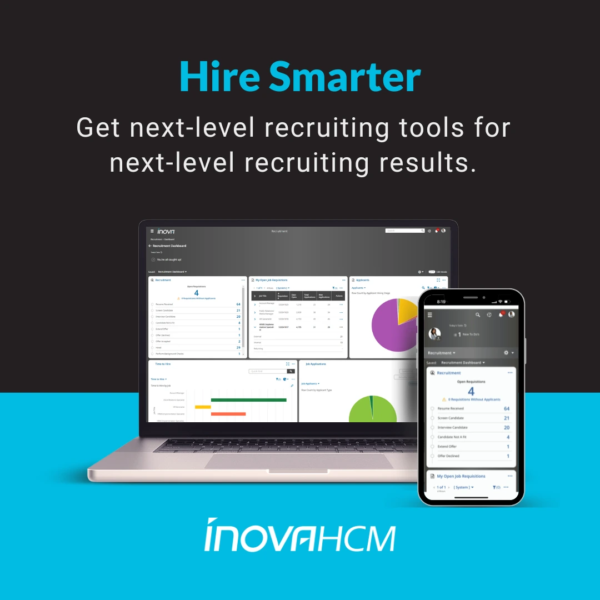When online resume screening was in its infancy, organizations tried out the technology in the hopes it would streamline the recruitment process. Having an algorithm that verified a candidate’s credentials before the recruiter spent time reading the resume has proven to be a powerful tool for HR professionals. Transferring this initial rote task to tech has become the norm, but where will AI take the recruiting process moving forward?
There are several aspects of recruiting that are already testing the waters of AI usability, and more are on the horizon. The market will decide, as it did with screening software, what will be the newest ways to source and hire.
Eight Ways AI is Transforming the Recruiting Process
Thorough Screening
A resume is a short, curated view of a candidate. It presents the data the applicant wants to provide, showing them in their best light. With AI, a more complete view of the job seeker can be made, with technology capable of checking their entire online presence. Dates of employment and job titles on the resume can be verified against professional media sites; publications and education may be verifiable. Over 90% of recruiters report they check an applicant’s social media presence at some point during the hiring process. Screening beyond the resume, into all professional and online social media information could save recruiters this time-consuming step and help ensure every candidate is interview-worthy.
Improving Job Posts
Optimizing advertisements for jobs is key to attracting top talent in your area and industry. Unfortunately, most businesses use their job descriptions as a template for the post, which is typically not the most dynamic way to get an applicant’s attention. AI can optimize the post – scanning other similar jobs to find the best language and format to attract. It can recommend changes or even make them automatically, to ensure your posting is prominent in search results and written in a way that makes job seekers want to apply immediately.
Initial Chats
AI-powered chatbots can help candidates through the initial process of applying for the job. They can answer simple questions about how to submit their resume or application; or respond to basic questions about the job, the company, and the process itself. They can replace recruiters at this first step in the process, freeing them to work on high value hiring tasks.
Hiring Accelerated
AI is also being used to move the candidate quickly from applicant status to scheduled interview. Job seekers who pass through the screening process are automatically directed to scheduling software that allows them to self-select a time to meet with recruiters for first interviews or hiring authorities or teams for follow-up meetings. Rather than having recruiters waste time trying to obtain everyone’s schedules, the tech allows each member of the group to upload their availability. The applicant makes the appointment, and AI notifies anyone participating of the upcoming interview.
Passive Recruiting
Many large job boards provide employers with the chance to participate in passive recruiting, leveraging technology to identify candidates that align with the company’s requirements and are located within the geographic vicinity of the business. These potential hires may not actively seek new positions but could be open to change if the perfect opportunity arises. With AI leading the way, businesses can not only receive notifications of qualified candidates but also streamline the process further by programming the technology to initiate inquiries automatically. This proactive approach enhances efficiency and enables seamless engagement with potential candidates who may not have actively sought new job opportunities.
First Interviews
Some companies are using AI video interviewing tools, either independently or along with hiring authorities, to help evaluate the candidate. These can be programmed to make standard inquiries of the applicant, often used by companies that have scripted interview processes, recording and potentially assessing the candidate’s response.
Other companies are using AI to assess candidates’ demeanor and body language, and sometimes even evaluate for truthfulness when the interview is being conducted online by two parties. These applications can be valuable tools to streamline the process and help guarantee the right hire for the position.
Predictive AI
AI can analyze an organization’s recruiting patterns, churn rates, market information, and other data to forecast future hiring needs. It can help HR professionals adjust their current practices or prepare for what’s coming. AI can also remind recruiters of past applicants who may not have been the right fit for a former job but are perfect for a current opening.
The technology analyzes where applicants are being lost in the recruiting process, potentially prompting opportunities for refinement or optimization. It also assesses which hiring managers have a larger new hire drop-off rate than others. This could suggest providing these managers with assistance to hire better or offer training on retention strategies.
Data from top-performing employees can even help AI predict whether a candidate is likely to accept a job offer and whether they’ll be a good fit for the organization.
Background Checks
A time-consuming but necessary step in the recruiting process is background screening. These include verifying experience and education but often go further. In some organizations, it’s necessary to screen for prior convictions of certain crimes. For jobs that pose a security risk, a credit check may be warranted. All these tasks are easily performed by AI, providing the result to the recruiter.
What’s Next for AI in Recruiting?
The future for AI in recruiting is promising, offering unprecedented efficiency and support to HR professionals. As technology continues to advance, we can expect AI to further enhance the recruiting process, allowing human experts to focus on more strategic and personalized aspects, such as cultivating meaningful candidate experiences.
While AI streamlines routine tasks, it is crucial to recognize the indispensable role of human judgment, empathy, and nuanced decision-making in navigating the complexities of talent acquisition. The synergy of AI and human expertise holds the key to unlocking the full potential of recruiting, ensuring a harmonious collaboration that maximizes both efficiency and human touch.





